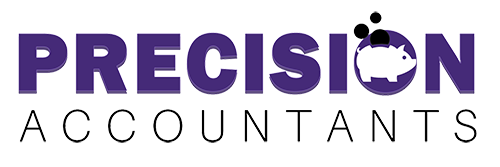Running a small business is rewarding. But managing taxes can be overwhelming. Between juggling expenses, planning for growth, and staying on the right side of HMRC, it’s easy to lose track of how much you could be saving. That’s where smart strategies come in.
Improving tax efficiency for small business owners isn’t about cutting corners. It’s about using the tax system to your advantage. From choosing the proper business structure to planning your salary and expenses, there are several smart ways to legally and effectively lower your tax burden.
This guide outlines key strategies to help you retain more of your profits, reinvest in your business, and avoid costly tax mistakes.
Want expert help to tailor these strategies to your business? The team at Precision Accountants Ltd is here to simplify your tax journey with hands-on advice and personalised planning.
Call us on 01732 387 059 or drop us an email at to enquire about our accounting services.
Take control of your future with strategic tax and financial planning. Trust Precision Accountants to provide expert guidance that helps small businesses across the UK minimise tax, maximise savings, and plan for long-term success.
How To Reduce Tax Liabilities For Small Businesses
Reducing tax liabilities requires a structured approach. These methods can help small business owners create a tax-efficient plan:
1. Choose The Most Suitable Legal Structure
The way your business is set up affects your tax obligations. A sole trader setup is more straightforward, but a limited company can offer better tax efficiency for small businesses through a combination of salary and dividends. Reviewing your structure annually with a small business tax accountant is a smart move.
2. Register For VAT At The Right Time
If your turnover exceeds the threshold, registering for VAT is mandatory. But some businesses benefit from voluntary registration. It enables you to reclaim VAT on purchases, enhancing cash flow and providing tax-saving strategies for small businesses.
3. Make Use Of The Annual Investment Allowance (AIA)
If you’ve bought equipment, tools, or IT gear for your business, the AIA allows you to deduct the full cost from your profits, up to £1 million. Strategic timing of purchases ensures you benefit from maximum relief.
Tips To Maximise Business Expenses For Tax Benefits
Knowing what you can claim as a business expense is essential to managing your tax bill effectively.
1. Identify And Claim All Allowable Expenses
One of the simplest ways to reduce small business taxes is by making full use of deductible expenses. These include:
- Rent, utilities, and insurance
- Business travel and vehicle costs
- Marketing, subscriptions, and training
- Office supplies and digital tools
Ensure you categorise and record these accurately to maximise business expenses for tax benefits.
2. Use The Work-From-Home Allowance
If you operate from home, you can claim a portion of your home-related expenses as a deduction. This includes heating, electricity, broadband, and even council tax, provided you have a dedicated work area. This often-overlooked claim can make a noticeable difference.
3. Track Mileage And Travel Expenses
Business-related travel (excluding your usual commute) is fully deductible. Keep a log of mileage, fuel, and accommodation if you travel for meetings, events, or site visits.
Tax Planning Strategies For Entrepreneurs
Being proactive with taxes ensures you’re not caught off guard. These forward-thinking tips support efficient tax planning for business owners:
1. Split Income Between Salary And Dividends
If you’re a company director, drawing a lower salary and taking the rest of your income as dividends can be more tax-efficient. Dividends are taxed at a lower rate than salaries, especially if you stay within the dividend allowance.
2. Time Your Income And Expenditure
Strategically delaying invoices or bringing forward purchases can help shift income or expenses into the most favourable tax year. This technique is beneficial for businesses that face fluctuating profits.
3. Make Pension Contributions
Pension contributions made through the business are deductible for corporation tax purposes. This is one of the most effective tax strategies for entrepreneurs seeking to save for retirement while minimising their tax bill.
4. Utilise The R&D Tax Credit (If Eligible)
If your business invests in innovation, research, or product development, you might qualify for R&D tax relief. This often applies even if the project doesn’t succeed—an underutilised benefit in many sectors.
CONTACT PRECISION ACCOUNTANTS
Why Work With A Specialist?
Implementing all of the above strategies can seem overwhelming, especially when you’re running day-to-day operations. That’s where professional guidance makes all the difference.
Precision Accountants Ltd specialises in creating tailored, compliant, and effective tax plans for UK-based small and medium-sized enterprises. Whether you need ongoing support or a one-off review, our team will help ensure your business is structured for maximum tax efficiency.
We don’t just crunch numbers. We help you make smarter decisions.
Conclusion
The tax landscape is constantly evolving, but with the right strategies, you can take control of your finances and keep more of what you earn. Whether it’s through claiming all allowable expenses, planning your income, or using available tax reliefs, boosting tax efficiency for small business owners is about working smarter, not harder.
Remember, small changes in your approach can lead to significant savings over time.
Seeking a partner who understands the intricacies of financial planning for small businesses? Precision Accountants Ltd is here for you!
Contact us today and discover how our expert team can help you reduce tax stress, stay compliant, and build a more profitable business.
FAQs
1. What are the most effective ways to reduce taxes as a small business owner?
Some of the most effective methods include selecting the appropriate business structure, claiming all allowable expenses, making pension contributions, and utilising dividend payments strategically if you’re a company director.
2. Can I claim home office expenses if I work from home?
Yes, small business owners who work from home can claim a portion of their household costs, such as electricity, heating, and internet, based on the business use. Keeping accurate records helps maximise this deduction.
